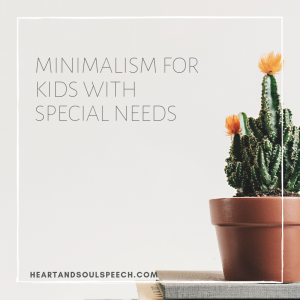Minimalism – Why it’s great for kids (especially kids with special needs!)
Minimalism. The KonMari Method. The Four Box Method. Feng Shui. Oprah’s Closet Hanger Method. I won’t lie; I’ve been purging like a crazy woman and loving it. I found twelve serving spoons that I’ve never seen in my life hidden in the back of a drawer. Twenty-two stuffed animals have been adopted by new homes. My husband has started hiding important items in fear they will end up in the donate pile.
But no matter your style, you’re going to want to join the bandwagon after learning just how great minimalism is for kids – especially kids with special needs.

It’s true. Babies often come with an overwhelming amount of stuff, adorable and often needed. Then those babies turn into toddlers and preschoolers with even more stuff. Add in extracurricular activities, science projects, and preferences in clothing style and hygiene products. Birthday parties and Christmas gifts. The towers of stuff piled on top of overpacked schedules–Childhood is chaotic these days.
Children with special needs typically have other challenges as well. More appointments. More difficulty transitioning between activities. Less ability to make choices, pay attention, process information, communicate effectively, self-regulate. We know the impact the environment can have on a child’s development. Kids don’t just benefit from having less, they really need less.
In my opinion, minimalism for children is two things: less stuff and less stress.
Make a note: That does not require you have white walls, underwear folded into thirds and color coded, matching hangers, or burn everything you own. And it’s ok if you do prefer that way. Minimalism should help simplify your life, not stress you out more.
What are the benefits?
Minimalism for Kids
- Creates a calm space to feel safe and welcomed
- Increased gratitude
- Cultivates creativity and imagination
- More time for building relationships with others
- More freedom to go outside or be active
Minimalism for Caregivers
- Increased mental health
- Fewer distractions and responsibilities
- Decreased stress
- More time for building relationships with others
- Models sustainable habits for our children
So how do we simplify our lives to help our children?
Simple Routines
Over-scheduling is the new norm unfortunately. If you’re like me, you pack it in wherever you can. These days, kids participate in every sport, club, competition, and project. Rest has never been on our schedule. I actually feel lazy or guilty when we aren’t on the go. However, after an hour of building forts and playing tickle monster with my toddler, I feel refreshed, connected, and surprisingly productive. Sticking to our simple routines helps children stay on track.
Give yourself a break
You don’t have to do it all. Listen up. Your kids are just as fulfilled playing hopscotch as they are doing the Pinterest-perfect craft you spent hours planning. Your kids don’t care how they look on your Instagram. A great day can be spent together laying under a tree talking about clouds – and you don’t have to justify it to your friends who are trying to be in two places at once.
Basic is Better
What does your child really need? I’m talking food, water, your love and attention, toothbrush, and seatbelt. Not 37 pairs of cute shoes. Probably not benefitting from a million Happy Meal toys thrown in a bucket. Soccer, violin, and Spanish class all in one day may just be too much.
Protect your Home
I love this idea of “decision fatigue.” If you’ve ever looked in your closet full of clothes and thought “I have nothing to wear!” then you’ve experienced decision fatigue. The same happens to our children with too many choices. Especially with toys. Try rotating toys by only having less than 10 toys that your child really finds interesting or challenging. Switch them out after a couple of weeks to keep it fresh. Donate what isn’t loved. Throw away what’s broken. After Christmas, our house looked like a fully stocked toy store. I left out all my son’s gifts for him to enjoy. You know what he played with for two solid weeks? – A stepstool.
Protect your Child
Children with special needs and those still developing need us to advocate for them. As adults, we get to take a spa day or have a beer with dinner. Children don’t know how to recognize they need a break or communicate they need a break. Of course they want to go to three birthday parties in one day, but where does that leave them at the end of the day? Exhausted. Fussy. Hangry. Overwhelmed. Think twice about your child’s interests, abilities, and needs the next time sign-ups are being passed around. Don’t apologize for resting. Recharge. Refresh. Reconnect.
What do you think about minimalism for our children?
Related Articles:
Choosing Toys for Language Development
